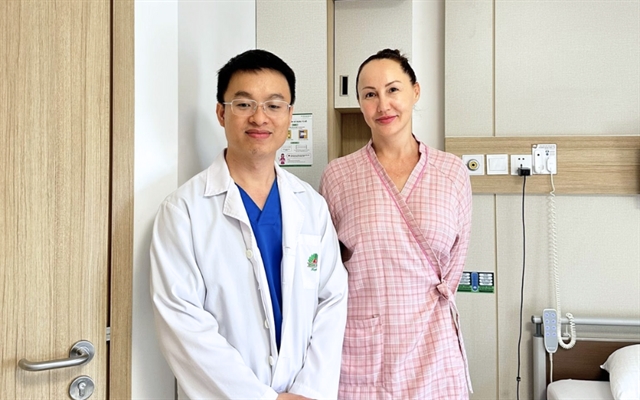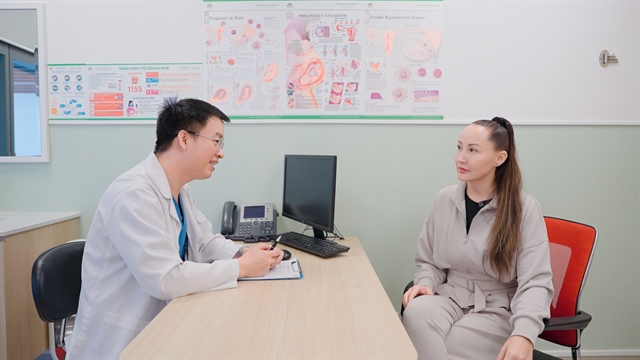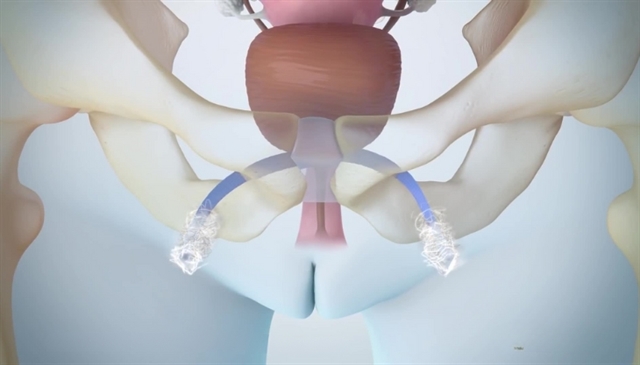 Society
Society

A thousand-kilometre journey to restore quality of life
After two vaginal deliveries, Tatiana, a 46-year-old Ukrainian woman, recently began experiencing bothersome urinary leakage triggered by coughing, sneezing or laughing.
At first, she assumed it was only a transient postpartum symptom.
However, the condition progressively worsened, causing significant embarrassment in social situations and even preventing her from participating in sports activities.
 |
| A Ukrainian patient regains confidence after urinary incontinence treatment in Vietnam. Photos Hồng Ngọc Hospital |
She had sought advice from friends and learned that surgery was considered the most effective solution. Yet, she hesitated after hearing that postoperative pain could be significant and recovery might take weeks. For a long period, Tatiana visited multiple hospitals across several countries, but she still had not found a definitive solution to her condition.
By chance, she learned that Hong Ngoc Phuc Truong Minh General Hospital had successfully performed numerous surgical procedures for female urinary incontinence. After careful consideration, she decided to travel to Vietnam for an in-person consultation with Dr Nguyen Van Xuyen, MSc, Specialist Level II, Head of the Gynecology and Breast Unit at Hong Ngoc Phuc Truong Minh General Hospital.
 |
| Tatiana decided to travel to Vietnam for an in-person consultation with Dr Xuyen. |
Through clinical examination and functional evaluation, Dr Xuyen identified that Tatiana had stress urinary incontinence due to weakened pelvic floor support. This pelvic floor disorder is common in women, especially after childbirth or during perimenopause, and can significantly impair daily life and emotional well-being.
To address the condition definitively, the team indicated transobturator tape (T.O.T) placement - an advanced and effective surgical method for treating stress urinary incontinence in women.
“The procedure went smoothly. In just about 30 minutes, the urethral support tape was successfully placed. With this outcome, the patient can feel reassured and return to normal daily activities,” Dr Xuyen said.
.jpg) |
| The team precisely placed the urethral support sling and finished the procedure in 30 minutes. |
After just two days, Tatiana was able to walk and resume normal activities, with her urinary incontinence completely resolved.
“I was truly surprised by how quickly I recovered. The doctors were highly professional, the process was clear, and the staff were very gentle. Everything felt completely safe,” she shared emotionally.
T.O.T surgery - a minimally invasive, rapid-recovery solution for urinary incontinence in modern women.
Currently, T.O.T (trans-obturator tape) surgery is regarded as the gold standard for treating stress urinary incontinence, with a success rate of 90–95 per cent. The technique uses a synthetic sling placed via a vaginal approach, acting as a supportive scaffold for the urethra. This enhances urethral support and prevents urine leakage while minimising tissue trauma to the surrounding structures.
 |
| The synthetic sling supports the urethra and prevents urinary leakage. |
Dr Xuyen said: “At Hong Ngoc General Hospital, the T.O.T procedure is performed in accordance with international standards, with an average operative time of only 30 to 40 minutes. Patients typically recover quickly and can resume normal activities within 1–2 days. Notably, the technique offers a very high success rate with low complication rates and virtually no scarring.”
Patient Tatiana added: “I am truly impressed by the professionalism of the medical team at Hong Ngoc General Hospital. Every step was quick, clear, and easy to understand. From consultation to postoperative care, everything was excellent.”
With a team of gynaecologic surgeons with more than 20 years of experience, along with advanced sterile operating rooms and modern medical equipment, the Gynaecology & Breast Unit at Hong Ngoc Phuc Truong Minh General Hospital provides treatment for a wide range of conditions, including urinary incontinence, pelvic organ prolapse, uterine fibroids, and ovarian cysts.
Through the use of minimally invasive techniques and internationally standardised care protocols, the unit not only serves domestic patients but is also increasingly sought out by patients from abroad for consultation and treatment.




